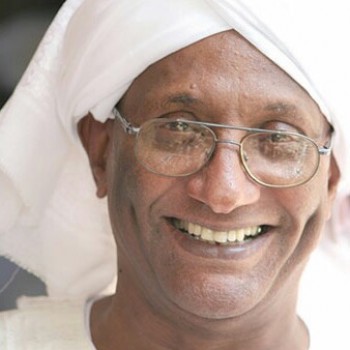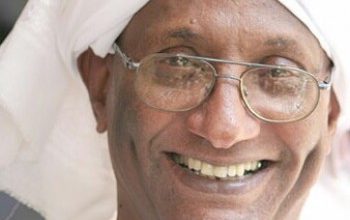Margaret Al-Shayqiyya: Kamal Al-Wasila himself is Bourgeois

By: Abdullah Ali Ibrahim
(May God have mercy on Mohammad Harun Kafi, who inspired me this article)
This is part of an old article in which I presented Mohammad Harun Kafi’s book, “The Sudan Conflict,” which he published after his withdrawal from the Sudan People’s Liberation Movement (SPLM) in 1996, which he had belonged to in 1986. It contains evidence of his share of it. The late Kafi is one of the distinguished writers on the heritage of the Nuba Mountains, who was the subject of his book “Al-Kujur,” published in the Sudanese Studies Series by the Institute of African and Asian Studies at the University of Khartoum. Here I content myself with presenting the fourth chapter of the book due to its humor. It is a gift from me to the friends who kindly congratulated me on my birthday.
The fourth chapter of the book The Sudan Conflict is a brilliant piece of fiction that has lost its way to this political journey. The chapter is very sweet because it is the result of the experience and long, transparent spiritual investment of a brilliant writer. The writer experienced the civil war, which is the most obscene of wars, closely. The civil war is a war of brotherhood. Despite its ugliness, it is also an arena for familiarity and acquaintance with these enemy brothers and a difficult discovery of the paths of this brotherhood that do not appear to the eye. War in Kafi’s book is what he knew and tasted, “and what is not about it in the stoned hadith.” One of the hidden surprises of this brotherhood is what Kafi narrated about the southerner, who was surprised by the presence of a northerner from the movement’s soldiers with a “mango color” among black fighters. The southerner found nothing to describe his fellow northern warrior except by saying, “He looks like prisoners of war.” These black northern warriors were known only to opponents in the government army. They would not approach these opponents until one of them was captured by them. This is a strange picture in the intimacy debate.
I do not remember reading anything recently as intense and absurd as a literary image as Kafi’s description of the Barua River in Ethiopia, through which he crossed “inside a mound full of monkeys and shadows.” I have not recently come across a description of the wit that qualifies as a sufficient description of a fighter in the SPLM. The man was from the southern Tiosa people. This is a group of nudists who are not embarrassed by the idea of covering up without being naked. They may also be attracted by clothes, so they choose what they like without stipulating that they cover up. The man was a major in the SPLM army, and he wore a suit bearing the mark of his military rank. Other than that, he remained naked, as his mother gave birth to him. Kafi said about the man, when he saw him one day, that he “kept walking completely naked except for his loud singing that accompanied his walk through the hot weather.”
War stretches reality to a stretch it was not created for and merges it with imagination in a way that no one expects. The story of the dogs of the southern city of Torit is an example of this surprising hybrid of reality and fiction. Kafi described how these dogs developed a new habit due to the extreme and prolonged war. When daylight came, which is when government planes bombed the city, the dogs would call and gather and leave the city and take refuge in the forest. She would return to the town at night when the plane bombing stopped. The dogs were calling to leave the city with a heartbreaking wail. She would return in the evening with the same heartbreaking sob. So contemplate!
This wonderful chapter in the book itself draws its narrative from another investment in the Civil War institution. Progressive northerners, who were dissatisfied with the superiority of their people and their oppression of the southerners, deposited their hope for an ideal future Sudanese situation by joining the Liberation Army of the SPLM. This decision took them to the southern tropical jungle, which Kafi described as “devoid of the Arabic language.” This northern tribe carried the habits of northern progressives in asceticism, love of Arabic poetry, and reading to the “water dividing line {equatorial} where Arabic literature is far away.” Kafi told the story of one of them who kept an article by a Moroccan writer for five years since he joined the SPLM in 1987. He showed it to Kafi and others in the heart of the forest in 1992. When they were alone, these group of fighting northerners would chat about poetry, especially the poetry of Professor Mahjoub Sharif, who had an elegant, revolutionary temperament. Kafi translated texts into English for the benefit of those who were not fluent in Arabic.
From the opportunity of this northern migration to the south, hybrid texts of the utmost kindness and significance arose. Homi Bhabha, the Indian writer, defined hybrid texts, which arise in the mixture of cultures, as “mimicry” texts with a presumption of imitation. The vocabulary of one culture is mixed with the vocabulary of another culture, one of them invades the other, and it is generated randomly, making people laugh. Perhaps what people laugh most about is that these texts, due to their extreme hybridity, deprive people of the cultural purity they claim or desire. Kafi was once surprised that the pagan tropical forest, which the government was mobilizing to Islamize and Arabize according to the claim of its opponents, had testified that there is no god but God even before the desired defeat befell it. Kafi heard two women from the south quarreling, in which they exchanged violent language and epithets. Then suddenly one of them said to the other, while they were still in the violence of the quarrel, “In the name of God, the Most Gracious, the Most Merciful.” It would be interesting for one to know why this non-Muslim woman needed the “basmalah” (saying in the name of Allah ….) in the context, time and place.
One of the patterns of immorality in the brotherhood war is what Kafi narrated about what happened to Kamal Al-Wasila, who was one of the northerners who joined the movement. One day, Wilson Kuwar, a southerner who studied in the north and worked in the Sudanese army until he became an officer and then joined the movement, asked him:
• What Did you say “his name is?
• Kamal Al-Din Al-Wasilah.
• Al-Wasila or Al-Wasita?
• Al-Wasila.
• You know that your is Al-Wasita not Al-Wasila?.
• But my father’s name is Al-Wasila, not Al-Wasita.
• The name of Al-Wasila I have never heard of. Your name is Kamal Al-Din, Al-Wasita, not Al-Wasila.
• Uncle Wilson, you know that if my father heard his name as such, he would get upset.
The audience, including Koor and Kamal, laughed. Kamal needed to extract what was right from his northern sheath in order to turn back the consequences of this arbitrary southern correction.
Kamal Al-Wasila, not Al-Wasita, remained in his tropical diaspora dealing with these hybrid texts. He was not always their target. Sometimes he was the initiator. Among these is what Kafi narrated about Kamal’s story with Margaret Al-Shayqiyya. This name, Margaret Al-Shayqiyya, is a fabricated text in itself. The text attributed Margaret, a southerner, to the Shayqiyya people, a northern people in the far north. Kafi said that he did not know why Margaret was attributed to the Shayqiyya, whom even the people of the north witness for their cunning and resourcefulness in achieving their goals. The story of Margaret and Al-Wasila goes like this. Margaret came to a vehicle that stopped in their neighborhood, and the vehicle was accompanied by the vehicle and his companions from the SPLM. The vehicle was loaded with tropical fruits, including bananas and mangoes, Margaret told Al-Wasila.
• Give me bananas?
Al-Wasila answered:
• Do you have a son?
• Nno. I haven’t given birth yet… Why?
• This banana is needed for the woman who has a child.
• If she hasn’t given birth to a child?
• Even if she does not give birth, they will forget her, they will forget her until she gives birth, and then they will give her bananas.
Al-Wasila here invoked the word “Younus,” which is “Younnis” in the Sudanese Arab dialect. However, in the terminology of the southerners, who borrowed the word, it came to mean a sexual act or intercourse. It seems that the sexual insinuations of Al-Wasila angered Margaret, so she called Kafi and asked him about the origin of Al-Wasila and his race, and Kafi said:
• He is from {the city} of Shendi {i.e., Jaali, a people from the north} with us in the SPLM.
• This man is himself bourgeois.
Kafi laughed when he saw that the text he was listening to was crowded with more cultures than he could handle, including the Marxist culture that had prevailed and then disappeared in the SPLM, as we saw above.
The texts we have reviewed are a unique Sudanese investment that brought together in a tragic hybrid hybrid Arab, Islamic, African, and Marxist examples by blocking the well-known Nile weeds that blocked the north from the south for a long time, and through the ropes of colonialism that deepened the gap between the two parts of the country, and through the arrogance of the Sudanese central systems after independence, which made matters worse. Alas. These texts flourished in the southern jungle thanks to the SPLM. One should not be optimistic that these smart texts will lead us to a beautiful hybrid homeland. The SPLM that gave birth to these texts lost freedom, which is the condition for the growth, promise, and goodness of these texts. It is enough that Kafi, who conveyed to us the news of these texts, chose to leave SPLM due to its excessive harshness and the blockage of its paths in the face of truth, until it became a movement that was draining of courage and lacking in wisdom.



